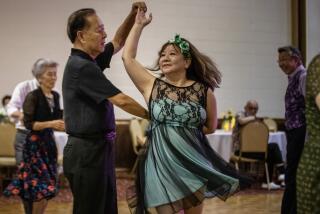Fonteyn Staying in Step With Life in Panama : Dance: The former ballerina applauds the U.S. invasion. She is in New York to coach ABT dancers and promote a film of her life on PBS. : Fonteyn Staying in Step With Life in Panama
- Share via
NEW YORK — Dame Margot Fonteyn, in New York for a visit, is a little wary of speaking about the political situation back home in Panama.
“I’m the least political person in the world,” she says.
“I do know that the media in the United States are terribly fond of telling everybody that everything that their government is doing is wrong. That they shouldn’t have invaded Panama and everything like that,” she says, with biting laughter.
“But as far as Panamanians are concerned, thank God the Americans came and did something!”
She speaks with forthright wit and genteel composure. At 70, Fonteyn seems even lovelier than when she was younger. Partly, her beauty is because it’s as if all the expressiveness of her limbs has gathered in her face.
At her stepdaughter’s apartment, she is wearing a black Angora sweater, a deep-purple, pleated skirt, and sturdy shoes. Her hair is swept softly back in a sort of modified French roll.
The former ballerina has a very slight limp, which she shrugs off as a bit of arthritis pressing on a nerve. “After all,” she says, “for 45 years when I needed it, that leg was there, at my service. How can I blame it if it decides to get a little bit lame now?”
She is in New York to coach American Ballet Theatre dancers in Sir Frederick Ashton’s “A Birthday Offering,” which was choreographed for the Sadler’s Wells Ballet’s 25th anniversary in 1956. She is also in the United States to promote a 90-minute PBS biography for the “Great Performances” series, “The Margot Fonteyn Story,” which airs nationally Feb. 16.
The morning of the day she arrives, a small item in the New York Post sets straight rumors that Fonteyn has been “living in squalor” in Panama and dying of cancer.
An “Entertainment Tonight” segment also squelches that story by showing her looking fit and living on the 600-acre ranch outside Panama City where she and her late husband bred and raised cattle. She settled there about nine years ago, shortly after her retirement, with her husband, Roberto Arias, who was paralyzed from the neck down in 1964 by a would-be assassin’s bullet. The ranch was Arias’ dream, but since his death last November, Fonteyn has been running the place on her own.
“I was out in the country,” she says of the U.S. invasion, which was centered in Panama City, 60 miles from her home. She was virtually untouched by the conflict, but “there was a time when it looked as though it might get very difficult to get food.
“I thought the situation might last for two or three weeks so I sent out for a lot of bags of rice. If we were running out of food we could always eat rice.
“There was a situation where the military had total control of the country and nobody was going to be able to change that if you didn’t come in and do something. The Panamanians really couldn’t. You should bear in mind that they’re peaceful people. When they wanted to protest, they went out and waved white handkerchiefs in the streets. They didn’t go out with stones. In a lot of other countries when people want to protest, they start out with stones. Panamanians protested for months waving white handkerchiefs.
“And you have to remember that when there was an election, . . . the opposition won by quite a bit. So what happened? The election was annulled. Now that means that the will of the people is being ignored. And I think you have to keep that in your mind when you’re worrying whether the Americans did right or not.
“What’s perfect?” she asks. “Whoever has a perfect government? By and large I think Mrs. (Margaret) Thatcher has done an incredible job, so everybody’s pulling her apart now. I suppose it’s human nature--as soon as somebody’s doing a good job, everybody complains.”
As told in her PBS “Margot Fonteyn Story,” Arias resigned as Panama’s ambassador to Britain to plan a revolution about the time Fonteyn paired up with Rudolf Nureyev, who had defected. She joined Arias in Panama and became unwittingly involved in a gun-running scheme. Arias escaped, but Fonteyn, left as a decoy, was arrested and deported to Miami.
When the Panamanian regime changed in 1964, Arias returned to politics and was gunned down, left paralyzed with his speech severely impaired. Fonteyn continued to dance and take care of Arias until his death.
La Quinta, her ranch in the lowlands near the Pacific, was abandoned before Fonteyn and her husband bought it. They cleared the property and built a house. What Arias originally planned as a shed for farm vehicles was redesigned, once the corrugated roof and cement floor were in place, as a pleasant home, Fonteyn says.
She was involved in the ranch’s daily operations, but only since Arias’ death has she had to run it. “I thought I’d better try to keep it going, though I don’t think I’m totally suited to it.”
What? Forty-five years on the stage hasn’t prepared her to run a cattle ranch? “He took all the decisions,” she says. “And he’s not there. When I say, ‘What shall I do about this?,’ he’s not there. I have to find a way to take decisions.”
She says she is still a novice at “just plain business management. Something I don’t know the least bit about.
“I was never really very confident about my dancing, and apparently I did that quite well,” she says, laughing shyly. “So I don’t think I’ll ever get to feel very confident about running a farm. Perhaps I’m not the kind of person who’s given to having a lot of confidence in what I’m doing. In the case of dancing, you always have to be dissatisfied, otherwise you’re not going to do it well.
“Now I can look back on my career and, for the first time, I can see that probably I was rather good. I didn’t think so at the time. I’m accepting now the fact that I was a great dancer. But it was contrary to my nature to feel that while I was doing it. Basically, I think, people who are self-satisfied aren’t very good. Usually, in most things, if you’re pleased with what you’re doing, other people are probably doing it much better.
More to Read
The complete guide to home viewing
Get Screen Gab for everything about the TV shows and streaming movies everyone’s talking about.
You may occasionally receive promotional content from the Los Angeles Times.






